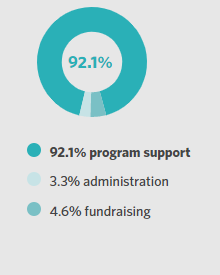In the city of Navotas in the Philippines, 18-year-old sponsored youth Cleo Soffia receives a notification from a group chat on her phone. It says “10-92.”
The message is an emergency signal code. There is a fire in the community. Cleo Soffia, a volunteer firefighter, must make haste to assist.
She puts on her uniform, helmet and gloves, which are all borrowed from the Bureau of Fire Protection (BFP). Her fire boots are the only piece of her attire she owns. She joins the rest of the firefighters, all men, at the Navotas Fire Station a few blocks from her home where she will ride on the fire truck to the scene of the fire.
There, Cleo and another firefighter hold the water hose to fight the fire, a responsibility sometimes far more dangerous than entering the fire itself due to the high-powered water pressure of the hose.
However, to Cleo Soffia, the benefits of being a trained firefighter far outweigh the risks. Her motivation for gaining firefighting skills was born of a need she recognized while growing up in a fire-prone area, called “a squatter’s area,” and hope for a brighter future that has grown inside her throughout her more than 10-year sponsorship in Unbound.
Courage Is a Firefighter
Youth battles blazes for love of her community in the Philippines’ Navotas slums
May 02, 2022 | Be Inspired
PRAYER AND A LOVE OF HELPING LIGHTS HER PATH
Cleo Soffia was a friendly, active 7-year-old when she became a sponsored child. She loved singing, dancing and reading books, a genuine love of learning which Unbound Quezon program staff helped her cultivate through the activities and seminars she enjoyed attending at the local office.
Now in her first year of college studying for a bachelor of science degree in criminology, Cleo Soffia dreams of one day being financially self-sufficient and believes that the path to achieving her dreams lies in completing her studies so that she can find a good job. Her dream also includes providing a more comfortable home for her parents, who she says are already tired from working and worrying about where to get money to buy food and pay bills.
Cleo Soffia’s father works as a fish vendor, buying and selling just enough fish every day to put food on the family’s table, while her mother has worked as a maid. Besides the funds she receives from her Unbound sponsorship, Cleo Soffia also receives financial assistance to pay for her education from an older brother working as a machinist overseas.
Cleo Soffia knew she wanted to help her community and, one day, a friend in her neighborhood introduced her to the idea of being a volunteer firefighter.
“She is telling me stories about her experiences in the BFP, that’s how I [developed] an interest in that field,” said Cleo Soffia, who continued to pepper her friend with questions about the field. “I wanted to have an experience on that job and eventually help my community, not only because of fire.”
At just 15 years old, Cleo Soffia became a volunteer firefighter with her community fire station. Every new firefighter receives training from the BFP. Being one of very few women in the BFP, Cleo Soffia challenged herself to learn the techniques.
“At first, there was nervousness of doing the actual thing,” she said. “But eventually, I was able to adjust myself and learn the strategies on how you can help the group of firefighters at the scene. It is dangerous even for male firefighters, [but] we need to save someone’s life.”
To Cleo Soffia, a firefighter’s greatest power is prayer followed by their gear and equipment. “We pray for our safety in the truck while we are heading to the fire scene,” she said.
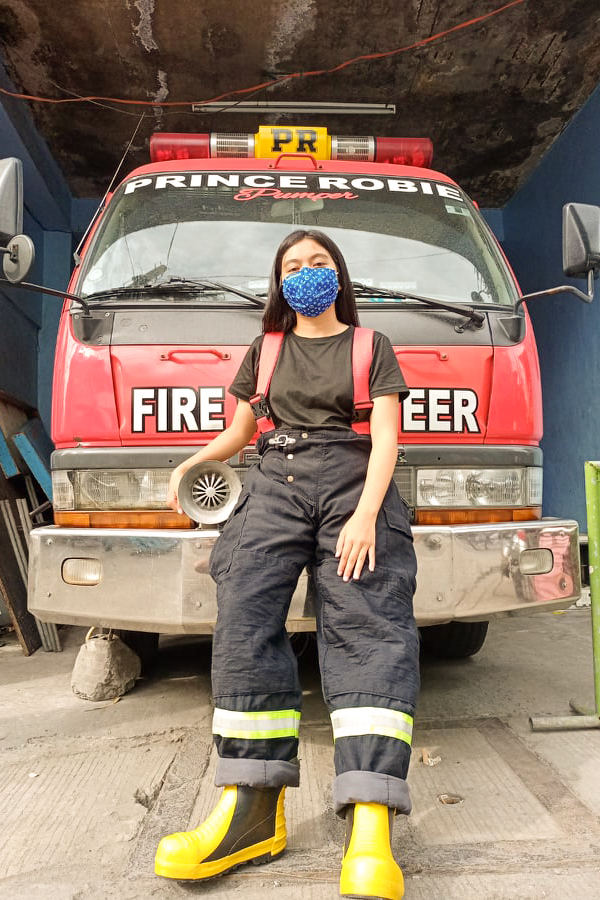
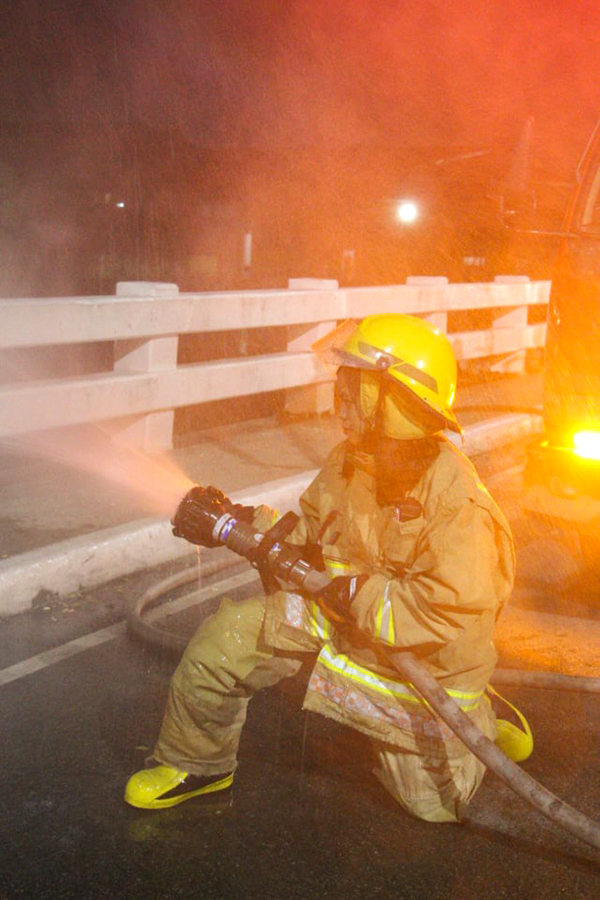
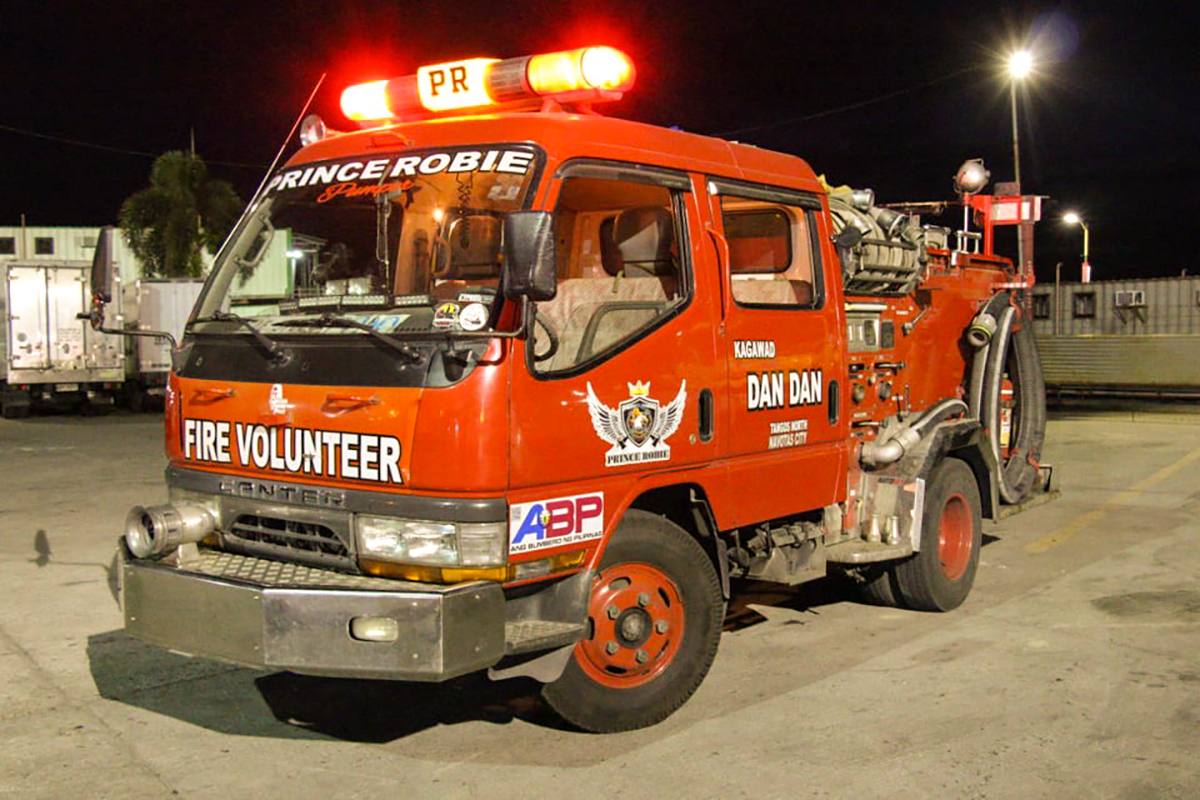
Photo 1: Sponsored youth Cleo Soffia has been volunteering as a firefighter at the Navotas Fire Station since she was 15 years old. When she’s not focusing on her studies in criminology, she visits the local Unbound office in her community or volunteers to do work at the Bureau of Fire Protection.
Photo 2: Cleo Soffia’s responsibility as a firefighter is to hold the hose during a fire. Due to the closeness of shelters in the slums, fire spreads quickly and easily, causing panicking crowds to sometimes take the hose away violently from firefighters in an attempt to put out the fire before their own shelter is engulfed.
Photo 3: Fire prevention campaigns are promoted by the Bureau of Fire Protection throughout the summer months in the Philippines, March through May. The closeness of the slum shelters, the light, flammable materials they are made of and narrow roadways between them make fire a frequent occurrence in the city and the firefighters’ jobs much more treacherous.
LIFE IN THE TINDERBOX SLUMS
As a highly urbanized area in the National Capital Region of the Philippines, the city of Navotas where Cleo Soffia lives and volunteers has just under 250,000 residents, many of whom make their homes in the tightly clustered, shoddily built neighborhoods known as “the squatter’s area,” or slums. Slums are traditionally defined as urban settlements containing crowded, compact housing units with poor sanitation, inadequate water supply, informal and often hazardous utility connections, and unofficial recognition by local governments, with residents historically being subject to relocation or forced demolition of their homes.
A study conducted in 2010 by the Philippine Institute for Development Studies examined the linkages of poverty and environment at the household level in slums in the Philippines, one of the top countries in Asia with many urban slum dwellers, and found that the population of informal settlements was increasing at an annual rate of over 3.5 percent compared to urban population growth rate of 2.3 percent for the time period of 2000 to 2006. By 2050, the population of informal settlements in one of the country’s premier cities, Metro Manila, is estimated to reach over 9 million alone, with migration of low- and middle-income people from rural areas seeking new or better income opportunities cited as the main cause.
Unbound Philippines Regional Reporter Teejay Cabrera often finds himself covering stories of those of the Unbound community who make their homes in the slums, anywhere from underneath skyway bridges or footbridges and vacant lots to riverbanks, abandoned buildings or overcrowded urban streets.
“Some were there since birth, and even from the birth of their parents,” Cabrera said. “Some find it good because their source of income is just around the corner … [but] some stay in the squatter’s area because they don’t have the capacity to acquire a better shelter for their families [due to] lack of financial aspect. It is not their choice, but they don’t have any other choice.”
According to Cabrera, a common response he gets from families he interviews in the slums is that they are living in fear, fear that anytime they might be forced to leave their homes because they do not own the lot their shelter resides on, and they do not have anywhere else to go.
But those shelters, often hastily put together with whatever the family can find or afford, are made from light materials — wood, scrap materials like tarpaulins and canvas, and plywood — that are easily destroyed by fires or typhoons.
Fires are another issue causing families to live in fear, as they are a common occurrence in the slums. In June of 2018, an article from The Guardian reported that there had been more than 2,000 fires in the Philippines capital already that year, with most of those in what the article called “tinderbox slum” areas. In March 2022, the BFP reported a 13% increase in fire incidents — with a total of 2,103 fires recorded from January and February.
Besides the shelters themselves being made of flammable materials, Cabrera cites other reasons for frequent fires including illegal wiring of electricity from a home’s electrical circuit to the power grid without a meter; connecting too many wires to a household electrical post; overheating of wires or appliances in summer; and lit candles being left unattended during blackouts.
Proximity of slum shelters to each other often means that if one home burns those around it are likely to as well before emergency services can get the fire under control. Such was the case for the home of the family of sponsored child Hannah in August 2021 in Quezon City, just a few hours drive from Cleo Soffia’s neighborhood.
An electrical fire that started in a neighbor’s house quickly spread throughout the slum community, burning for 2 hours and engulfing 15 homes. Due to the narrowness of the slum streets, firefighters had a difficult time reaching the scene of the fire, and Hannah’s home, which was 35 years old and made mostly of wood, was a total loss, along with all their belongings. The family has since rebuilt with assistance from Unbound’s Critical Needs Fund.
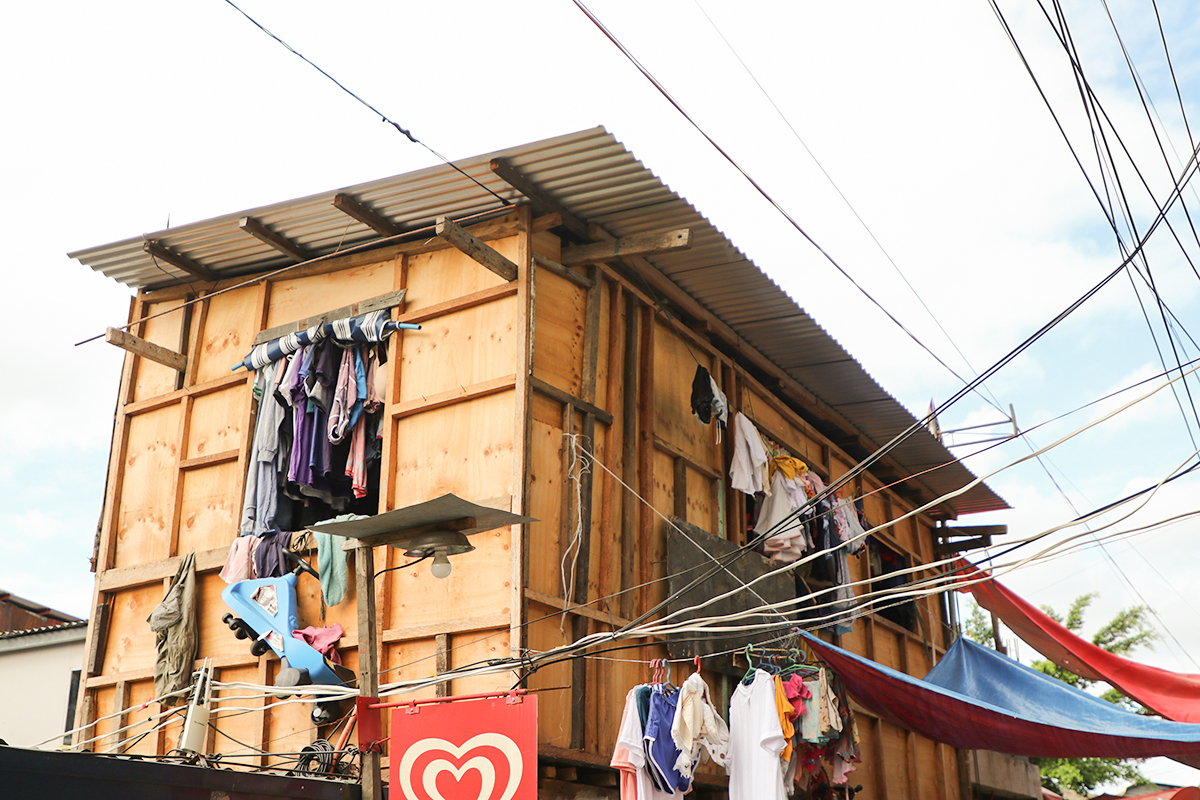
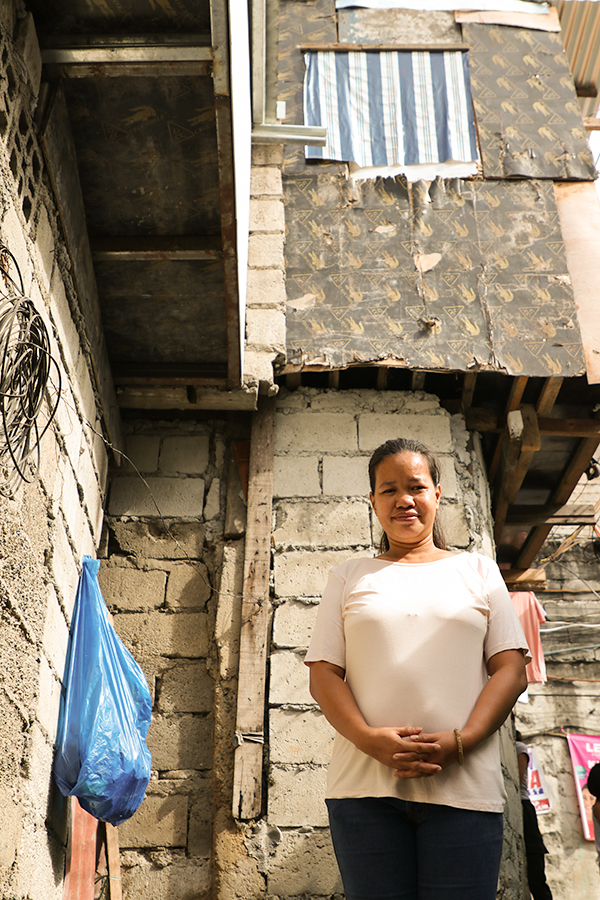
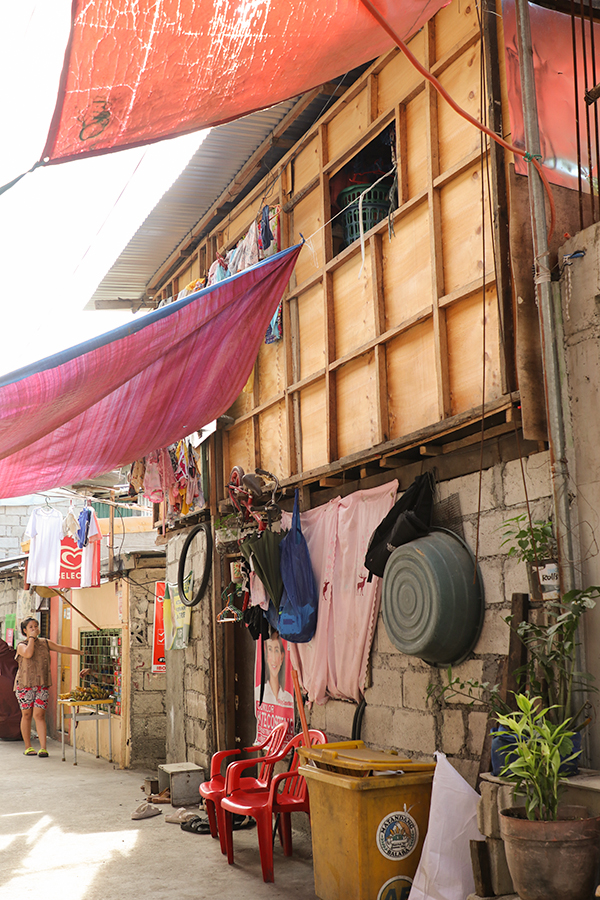
Photo 1: Pictured is the new home of sponsored child Hannah and her family in Quezon City. The old home was one of 15 other homes in the neighborhood that caught fire in August 2021. With assistance from Unbound’s Critical Needs Fund, Hannah’s family was able to rebuild their home in the same location as the home that burned.
Photo 2: Estrella, mother of sponsored child Hannah, stands in front of their new home in the Quezon area. Estrella works making doormats and rugs, while her husband works in construction and is only able to return home every three weeks.
Photo 3: The home of sponsored child Hannah is in this informal settlement in Quezon City. Without help from Unbound’s Critical Needs Fund, the family would not have been able to rebuild their home, according to Hannah’s mother, Estrella. Before the fire, town officials had verbally told area residents that the city would allow them to own their properties, she said. “That verbal communication to us was the only thing that we have and where we hold onto,” said Estrella in reference to home ownership.
THE COURAGE OF A NAVOTAS FIREFIGHTER
On the first Sunday in May each year worldwide, fire sirens sound for 30 seconds at noon. This event is known as International Firefighter’s Day (IFFD), and the sirens are followed by a moment of silence in memory of, and respect for, all firefighters and the sacrifices they make to ensure their communities and environment are kept safe.
There are many attributes that make a good firefighter: adaptability, good communication and teamwork skills, dependability, dedication and being physically fit, to name a few. Courage, however, is the main attribute that comes to Cleo Soffia’s mind.
Besides the obvious dangers of fighting the fire itself, the main challenge she faces as a Navotas firefighter, according to Cleo Soffia, is sometimes the desperation of the crowd as they refuse to stand helpless, watching their shelters burn.
“There are areas that people are violent, they are forcibly taking the hose from you,” Cleo Soffia said. “Sometimes we just let them get the hose rather than getting hurt by them.”
Despite this, no one understands the plight of the anxious crowd better than one who has lived among them, which is part of what drives Cleo Soffia to take such risks. For most of her life, Cleo Soffia, her parents and four siblings, lived in the squatter’s area before taking the opportunity to move into a government housing project that is a better shelter structurally, cleaner and less crowded, but still close to the family’s main sources of income.
“If I will be knowledgeable in fire protection, then I will be able to help my community,” Cleo Soffia said. “My parents are telling me to take care of myself first, but I am telling them I should take care of you, my family, and our community also.”
To her, the benefit of being a firefighter is more than just having the physical ability to fight the fire. To Cleo Soffia, the benefit is knowing she is giving something back to her community, a community that already has so little that can be taken from them.
“For the emotional side, I know I am helping my community in the least that I can do,” Cleo Soffia said. “I am also helping my fellow men; it is heartwarming and stress relieving when you will hear them say ‘thank you’ for helping them.
“I sometimes get bruises, but that is manageable. I feel so happy helping people in need, like what you do in Unbound.”
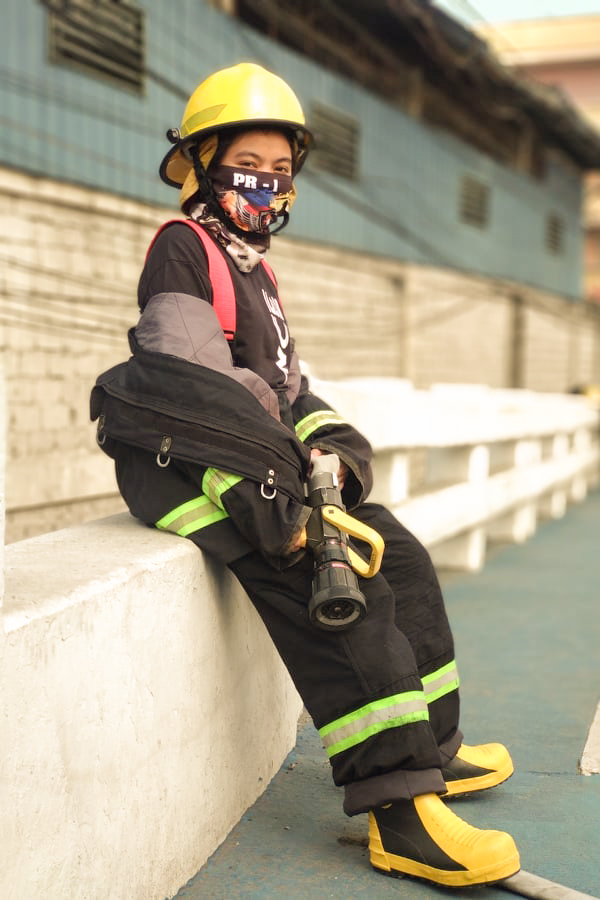
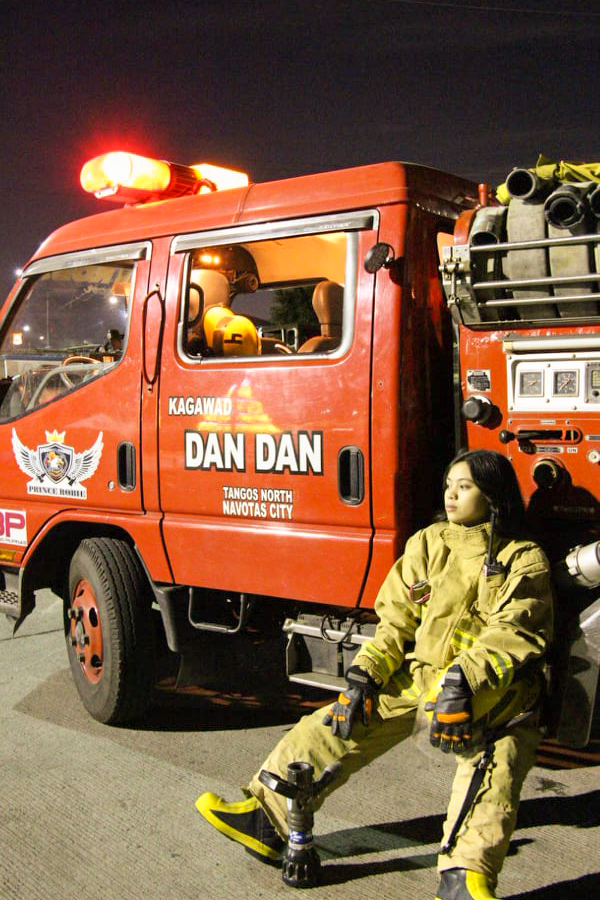
Photo 1: Cleo Soffia sits outside the BFP in her borrowed training gear. To be a firefighter, she said, it takes courage, dedication to trainings, patience and perseverance to achieve your goals. To other youth seeking a career in the field, she had these words of advice: “Focus to your goals and don’t forget to pray always so that you will be guided.”
Photo 2: Cleo’s goal with becoming a firefighter is to help not only her family but also her community in fire prevention and during times of fire outbreak. She thanks Unbound and her sponsor for giving her hope and the right platforms to reach her goals and dreams in life.
My parents are telling me to take care of myself first, but I am telling them I should take care of you, my family, and our community also.
— Cleo Soffia, sponsored youth and firefighter in the Philippines










